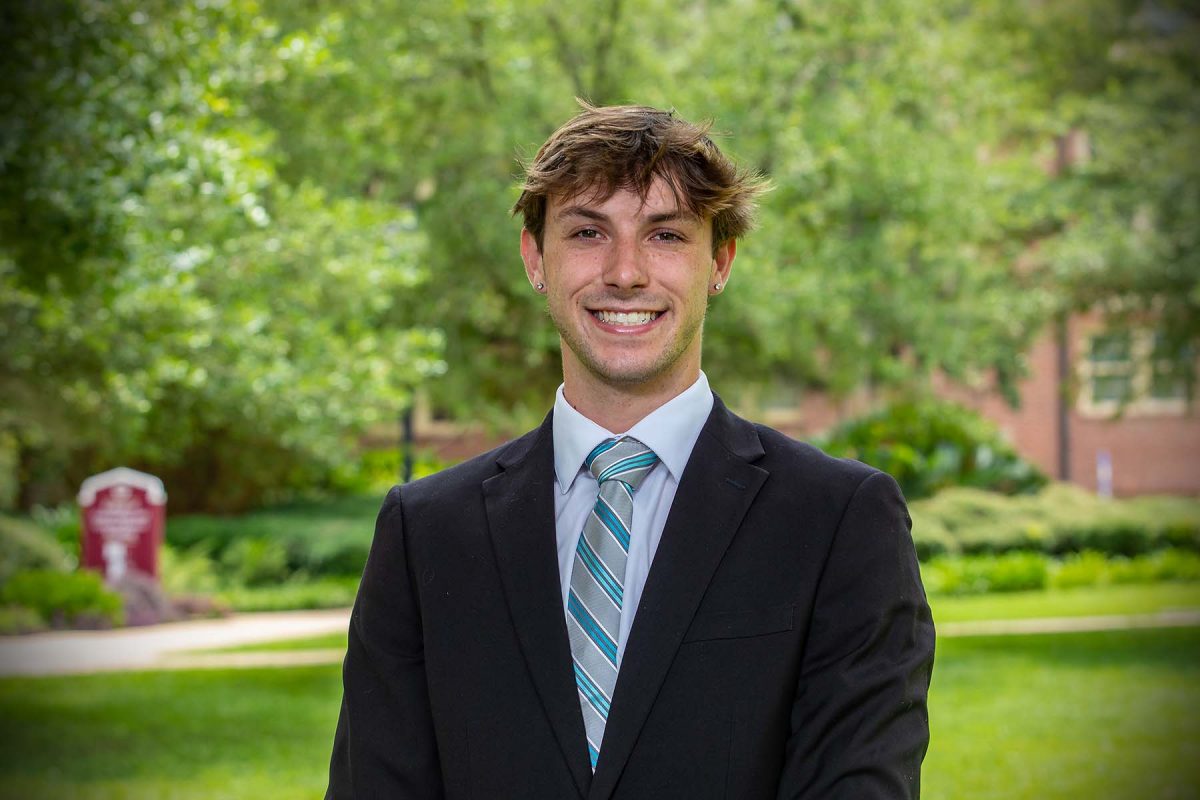
“I have had the opportunity to take on various roles at FSU that my high school self certainly would have been too intimidated to fulfill.”
Fast Facts
- On campus: Has lived on campus his entire time at FSU and worked six semesters as a resident assistant
- Favorite campus dining spot: The Suwannee Room
- Favorite study spot: Middle of the third floor of Strozier Library
- Bargain hunter: Nearly all of his clothes are thrifted
- For fun: Plays intramural soccer
Florida State University has had a profound impact on Andrew Lodge, who fell in love with the campus and discovered opportunities for personal and professional growth.
Through the Undergraduate Research Opportunity Program (UROP) and Directed Individual Study, Lodge found himself working in the research lab of Thomas Joiner, Robert O. Lawton Distinguished Professor of psychology, focused on suicide-related conditions and behaviors. With Joiner and research mentor, Sean Dougherty, Lodge delved into the intricacies of assessing and treating those at risk for suicide.
Lodge’s research project, funded by an FSU IDEA grant, aims to develop behavioral therapy techniques that can be applied across diagnoses, age groups and cognitive abilities. His research also involved creating measures to improve suicide risk assessments in clinical settings. That suicide risk assessment is now used by clinicians at FSU’s Psychology Clinic.
“By participating in the UROP program, I was able to narrow my research interests, build professional relationships with faculty and other students and hone professional skills that have continued to benefit me in my research endeavors after UROP,” Lodge said.
Lodge’s journey at FSU wasn’t solely focused on research. One of his most rewarding opportunities was his involvement with University Housing.
He was vice president of the Inter-Residence Hall Council his freshman year and later became a resident assistant (RA) to help enhance the on-campus experience for FSU students. Through these roles, he forged connections with students from various backgrounds.
“I have been grateful to assist students in optimizing their FSU experience by connecting them to clubs, informing them about mental health resources on campus, going to career fairs with them, helping them get involved with research and so on,” he said. “I am currently finishing my sixth and last semester as an RA, and I can confidently say that it has been one of the most rewarding positions I have ever held.”
Lodge’s leadership extended further as vice president of the Student Staff Advisory Council (SSAC), an organization that supports student staff on campus through being and advocate and professional development. Through his involvement with SSAC, Lodge challenged his growth as a leader while supporting others in their leadership roles.
Heading into his last semester, Lodge looks back with gratitude.
“I am honored to have aided my local community in meaningful ways through both my research and leadership roles,” Lodge said. “The network of relationships I have developed with students and other staff are an invaluable component of my FSU experience.”
Lodge is excited to take his next steps as a future clinical psychologist with the belief FSU has prepared him to make a difference in the world.
What sparked your interest in studying suicide-related conditions and behaviors?
Through UROP, I had the opportunity to delve into suicide literature and learn about our understanding of the etiology of suicide-related conditions and behaviors. I learned that research has played, and will continue to play, a pivotal role in preventing suicide, one of the leading causes of death worldwide. With newfound understanding, I became inspired to join this effort and leverage research to combat suicide.
In what ways has your work with UROP influenced the mark you want to make in clinical psychology?
I came to college with an interest in psychology. Through the UROP program I was inspired to pursue a career conducting research in clinical psychology. UROP opened my eyes to how research is conducted across multiple disciplines and the impacts research can have on others. By serving as a UROP colloquium leader, I recognized my passion for teaching and mentoring others, something I hope to continue in graduate school and, eventually, as the principal investigator of my own research lab.
What inspired you to become involved with University Housing?
My involvement with University Housing began when I ran for Hall Council vice president for Broward, Landis and Gilchrist my first year as an effort to get involved, a challenging task during COVID. Through Hall Council, I connected with resident assistant (RA) advisers who played a pivotal role in supporting my professional, academic and personal development. Hall Council also hosted community-wide events where I got to see the role Housing plays in connecting students to FSU. I became inspired to further involve myself with Housing as an RA so I could impact the lives of other FSU students.
What are the most valuable lessons you’ve learned at FSU?
I’ve learned how important it is to get outside of my comfort zone. Experiences I initially thought were the most daunting have been the experiences I have grown and learned from the most. I’ve also learned to enjoy the day-to-day monotony. Initially, it was easy to treat college as a means to an end (i.e., a career) rather than four significant years of my life. I am much happier when I make time to appreciate the significance of every day. I plan to maintain this mindset as I move through my academic and professional career.
Any advice for current or future FSU students?
Attend campus events! They are an incredible way to learn about the resources FSU has to offer, something I underestimated when I started here. Plus, events are a great way to get outside of your comfort zone, meet new students and even get some free stuff.



